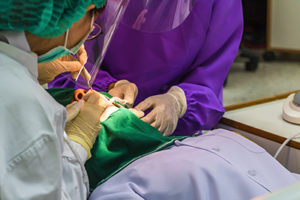Why does someone have oral surgery? The reasons may come as a surprise why you might go to the dentist to have this done. Surgeons should do the procedure who have expertise and knowledge. They diagnose and treat conditions that relate to the face, mouth, and jaw. It can involve muscle, skin, and bone. Included are removal of teeth, providing dental implants, and surgery to your gums. Insurance companies usually consider this type of surgery medical rather than dental.
What Are Some Reasons For Oral Surgery?
There are many reasons someone may require oral surgery. Surgery may be the answer when you have the following:
- Removal of a wisdom tooth
- Impacted teeth and removal
- Exposure-impacted tooth
- Bone grafting
- Oral pathology
- Dental implant procedure
What Are the Types of Anesthesia Dentists Use?
Three types of anesthesia are used for this kind of surgery: local anesthesia, general anesthesia, and IV sedation.
The local anesthesia is similar to what you might have had when you had a cavity and received a dental filling. You only feel the pressure of the dental tools. Sometimes nitrous oxide, known as laughing gas, mixes with local; you will be conscious, and there will be few side effects after it wears off.
Being “put to sleep” is the feeling of general anesthesia; the patient has no memory of the procedure. It is often used to remove an impacted wisdom tooth, the placement of a dental implant, or for any surgical procedure on a large scale.
IV sedation is sometimes called “twilight sedation” and is intravenous sedation with the patient feeling like drifting in and out of consciousness. They do not remember the procedure except for the feeling of being asleep and relaxed.
How Long Does It Take to Recover From Oral Surgery?
Primarily, it is important to follow the instructions given to you by the surgeon. You will get post-operative instructions to follow.
You may get a prescription for pain medication or have instructions to ice the area.
For the extraction of a tooth, for the first 24 hours, you will need to not engage in physical activity, rest, and not go to work or school. If you had general anesthesia, you should not drive.
Bleeding may occur in the first 24 hours for a tooth extraction; it may, however, be slight. Biting down on a moist tea bag may help as the tannic acid in the black tea helps with clotting. You can use sterile gauze as long as you do not fall asleep.
Swelling is normal, and you may need to prop your head up with a few pillows while sleeping or resting. Using ice can also help reduce swelling.
By the second or third day, you may be ready to return to work or school. If multiple teeth are part of the extraction, it may be a full week or more before you can return. Swelling usually disappears in seven to 10 days.
You will need a follow-up appointment after two weeks to ensure that the healing is going well and there is no infection.
Contact Lovett Dental Northside Today
Getting oral surgery can help improve your oral health dramatically. Lovett Dental Northside offers an array of services, in addition to this type of surgery. Some of these services include:
- Dental Veneers
- Crowns and bridges
- Pediatric dentistry
- Teeth whitening
- Root canals
- Implants
Do not let fear prevent you from having this surgery. You can have a healthier mouth and smile. Contact Lovett Dental Northside at 713-691-5551, or contact us online, and we will get you on the road to a life without dental pain.
